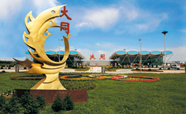Village cluster cradles foster care approach
Over the past 42 years, Cai has provided foster care to more than 30 orphans from the institute. Many of them have congenital disabilities.
Most of Cai's foster children have grown up. Some went to college, married and earned their own livings.
But Cai's years of devotion caused her two biological sons to marry in their 40s, which is considered very late for rural men.
In 1968, Cai received a 9-yuan ($3.66 according to the exchange rate at that time) monthly allowance from the institute for raising a foster child. The allowance has gradually increased to 650 yuan ($98). The institute also covers the children's education and medical expenses.
"The allowance is actually not a small amount of money for farmers here," Cai said, rubbing her hands together. The annual income of a Sancha farmer is about 3,500 yuan.
"But I didn't do it for money," Cai said, in the drawling local dialect. "I just want to give those less fortunate children a mother's love, a home to depend on."
Many other women in the village have become foster mothers since the 1960s. They bring up these children as their own, build houses for them after they grow up and prepare weddings for them with their own savings.
Located at the foot of Cailiang Mountain in northeastern Datong, Sancha is known as "China's Foster Mother Village", as it has become the country's cradle for this form of parenting.
Villagers have raised more than 1,300 orphans since the 1960s, village Party chief Wang Ting said. About 320 foster children are now being raised in Sancha. More than 90 percent of them have disabilities. Many were born with cleft palates, limb deficiencies or lack of sight.
Although the Ministry of Civil Affairs issued a regulation to encourage families to take in foster children in 2003, family foster care is still new in China, where the tradition of the orphanage has been the rule.
But it became the norm in Datong since the Datong Institute of Social Welfare was founded in 1949. Since then, more than 7,000 orphans have been brought up by 1,500 families in about 50 local villages, including Sancha, Xiezhuang, Xiluotuofang and Tangjiabao.
Copyright 1995 - 2010 . All rights reserved. The content (including but not limited to text, photo, multimedia information, etc) published in this site belongs to China Daily Information Co (CDIC). Without written authorization from CDIC, such content shall not be republished or used in any form. Note: Browsers with 1024*768 or higher resolution are suggested for this site.

